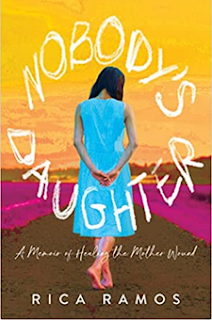Rica Ramos is the author of the new memoir Nobody's Daughter: A Memoir of Healing the Mother Wound. She also has written the book Petals of Rain.
Q: What inspired you to write Nobody’s Daughter?
A: I had just remarried, and while that was wonderful and exciting, being in this new phase of life forced me to confront my mother about the trauma she’d raised me to forget. My in-laws had not met my side of the family, and it actually made me physically ill thinking about bringing my stepdad into the fold. I’d dropped a bomb when I asked my mother to attend my wedding without him.
That was the start of all the chaos, which I navigated through the writing process. Picking up all the pieces and putting them together in story form gave me some clarity and a sense of closure. In many ways, it was like packing for a move. I had to pull it all out of the closets, examine it, and decide what to let go of and what to keep.
Q: How was the book’s title chosen, and what does it signify for you?
A: It was not the original title. There were actually many iterations. Before settling on “Nobody’s Daughter,” the title was “Which One of Us Is Broken,” but my publisher proposed a change, noting that calling myself or my mother broken wasn’t a good approach. We then decided that “Nobody’s Daughter” conveyed the book’s themes more accurately.
I know there are many other daughters who don’t feel truly loved and accepted by their mothers, so I hope the new title makes them feel acknowledged and understood.
Q: The writer Allison Hong Merrill said of the book, “In a fiercely candid voice, Rica has created a tale that resonates with the universal truth that our past doesn't define us; it refines us.” What do you think of that description?
A: I love how Allison summed it up. She’s a beautiful person and a keen observer. She too has a past that has refined her, and I applaud her and all women who find a way to move through trauma to a healing place. This is why I write—not only to make my way, but to create stories that resonate with others and continue the essential conversations. It gives us a voice and a forum.
Q: What impact did it have on you to write the book?
A: The book was a medicine for me. I really digested the past—years of locked-away truths. I was able to go back in time and give myself the mothering I lacked. Even as an adult, we need that. It was hard to admit it because people think growing up means aging out of the pain of our pasts. I felt guilty about my suffering because I had a career, a good husband and so on. Why couldn’t I just drop the baggage?
But there was a grieving process that needed to happen, and I’d been denied that my whole life. It’s important to be validated, and I’d been seeking it from my mother. Writing and therapy helped me let go of my expectations and take control. I essentially said to myself, “You’re responsible for making this happen. You don’t need your mother’s or anyone else’s permission to heal.”
Q: What are you working on now?
A: I’m around 65,000 words into a fiction novel about two friends who are torn apart by what each perceives as betrayal. They lose contact and build new lives but then realize the past demands to be dealt with.
It draws a lot of parallels to my own experiences, which I think is true of most fiction. We can’t invent stories outside of our heads. And the best books are made with our hearts. I see stories as life’s leftovers made with the ingredients we’ve tasted—love, pain, hopes and dreams, etc. I’m excited about fiction because I have the freedom to play around with the ending.
Q: Anything else we should know?
A: I want to thank you for this interview. I enjoy engaging with women who understand my story, writers and readers. I encourage people to reach out so we can mutually support one another. I also love book recommendations. I’m always looking to pile more books on my shelves!
--Interview with Deborah Kalb


No comments:
Post a Comment